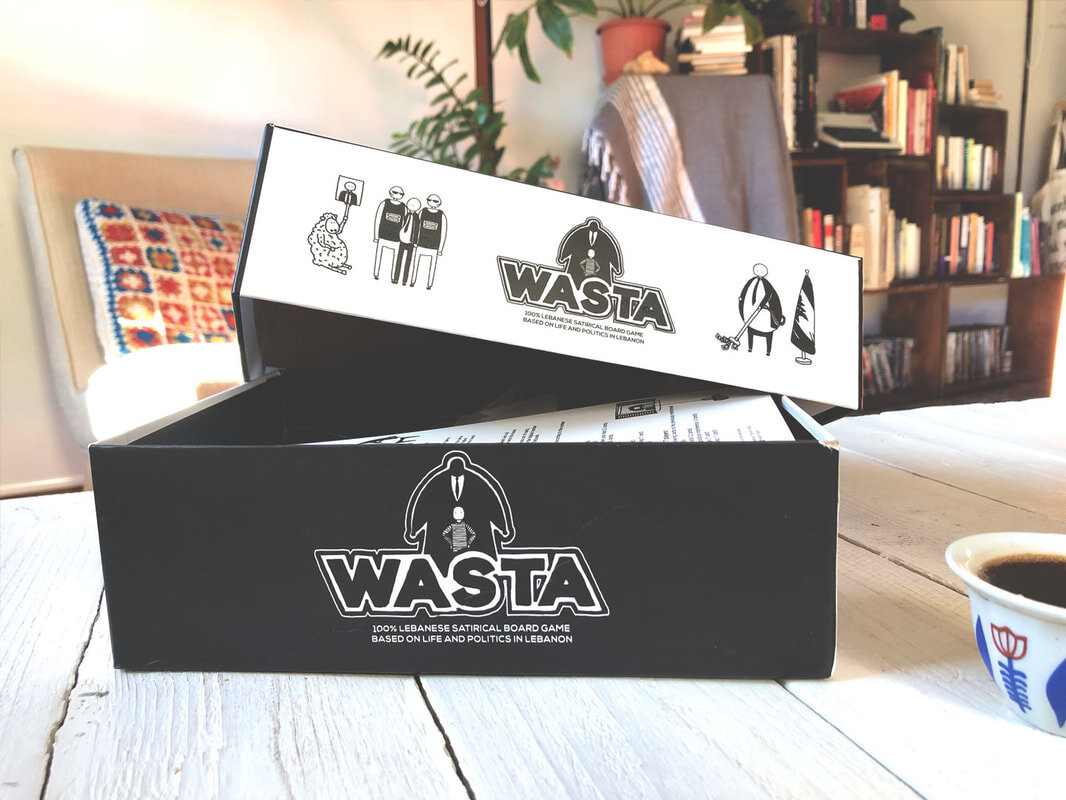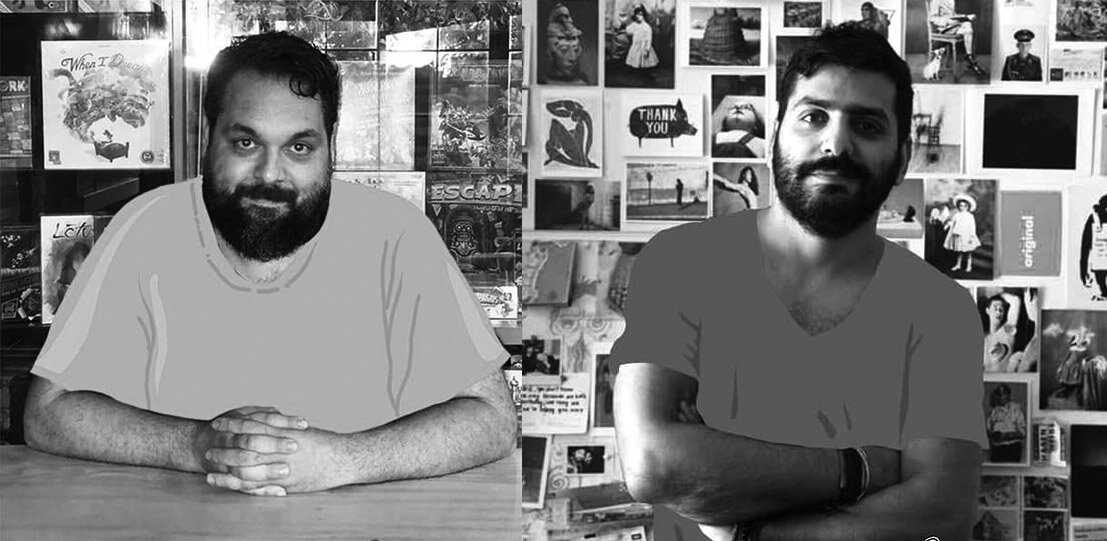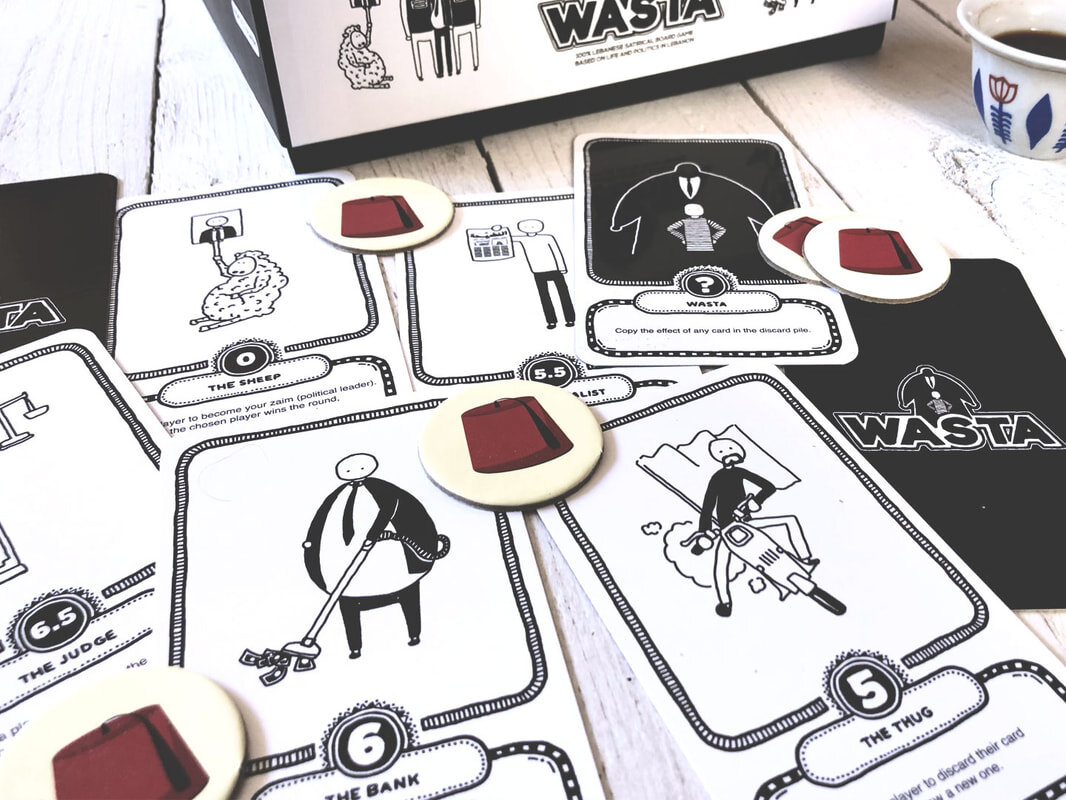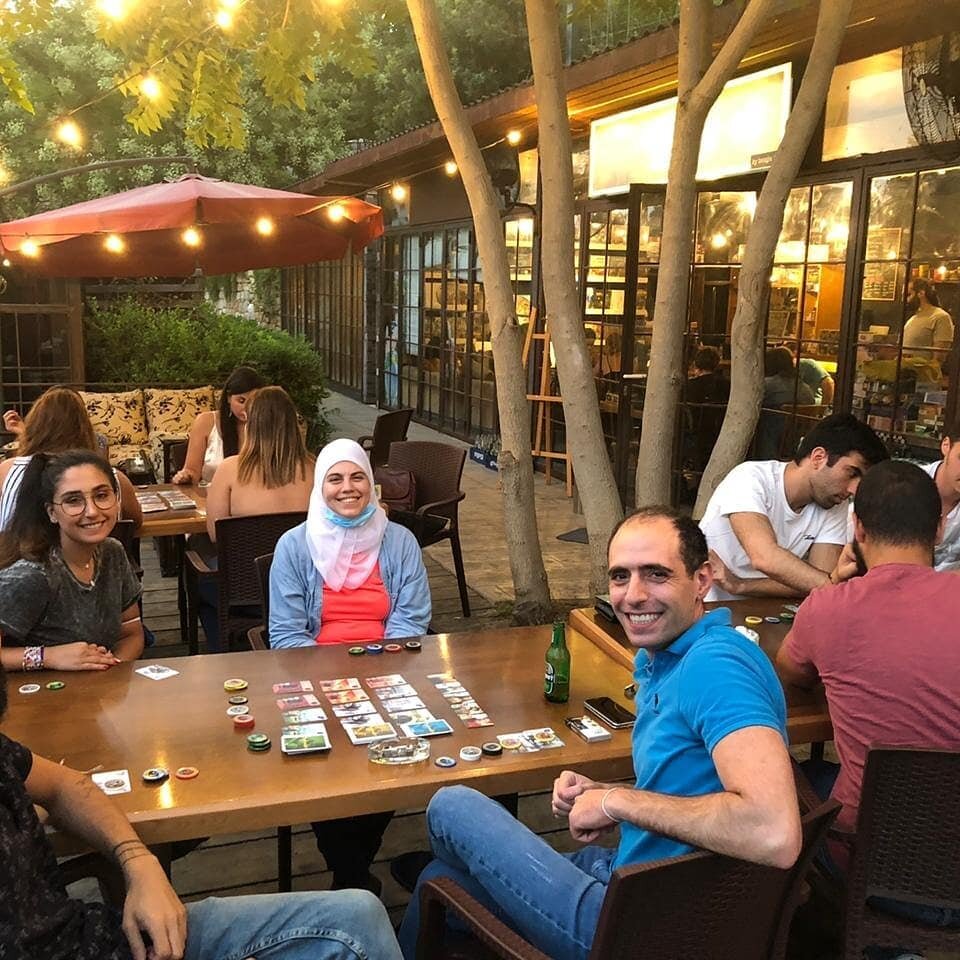
Wasta is a Lebanese satirical board game based on life and politics in Lebanon, created by Elie Kesrouany from On Board. and illustrated by Bernard Hage. Available in Arabic and English, order it via Instagram @onboard.lb.
Victoria Schneider
Lebanon’s endemic corruption and economic crisis had people in the doldrums, which was further exacerbated by the outbreak of Covid-19. With the looming pandemic, everyone had the blues. So Elie Kesrouany, an effervescent and entrepreneurial Beiruti, came up with a new game.
In depressing times, the 37-year-old realized, people need to laugh, they need a release. His passion is board games, so why not work out a game to address the situation, where he could merge his desire to help people have fun and relax, while perhaps creating a new income stream that would help his business survive?
The result was Wasta, a board game that captures the essence of Lebanon today. Wasta is a heavily loaded term in Lebanon and the Arab world, expressing the use of connections in order to get somewhere. It can loosely be translated as “nepotism.”

Game store owner and designer Elie Kesrouany, illustrator Bernard Hage.
“Wasta the game is a sarcastic way to criticize Lebanese society and all the things that are going wrong,” says Kesrouany. Featuring subtle black and white caricatures designed by Lebanese caricaturist Bernard Hage, AKA “the Art of Boo”, the vision was to create community among young people, who find themselves angry and lost.
“Our country is rife with wasta — full of corrupt people who are in the wrong positions because of it,” Kesrouany says. He is a big man with a kind voice who wears shorts and crocs, staying casual for comfort in the summer heat. He runs a board game store and café just outside of Beirut, which he opened a few months into the time when things started going downhill in Lebanon. “On Board” stocks 150 board games, which the entrepreneur mostly imports from outside the country — an increasingly challenging endeavor as the value of the Lebanese pound has sunk to a new record low.
Sitting on one of the outside tables of the shop, he is sipping fresh pomegranate juice, his favorite. He says it was the economic crisis that pushed him to begin developing Wasta. Other projects to facilitate online games during the lockdown, or sell his board games on Instagram, were crushed by the worsening financial situation in the country.
“The inflation of the dollar forced me to think differently,” he says. So he took one of the most relevant words of the modern Arabic language and started playing with it. Every game card has a deep meaning and touches a nerve of Lebanese society. There is the police officer (Darake), the thug (Az3ar), the mother (Emmak), the neighbour (El Jara). A politician, a judge, a journalist, and, one of the most important symbols: the Lebanese flag.
“Corrupt people people are in positions they shouldn’t be in because they know someone. And people are not doing their job. When you lose the Lebanese flag you lose your pride, you leave the country and lose,” explains Kesrouany.

“There is the thug, and there is a lot of them here. They follow the warlord. The thug card says you can force someone to throw their card. And when someone has the Lebanese flag and the thug forces him to throw it, you force that person to lose.”
The game captures Lebanon in a nutshell. The Wasta card itself allows the player to copy almost any other card – imitating life in Lebanon.
“People use their family or social contacts to cut in line and gain quicker and better access to schools, universities, hospitals or jobs,” noted Transparency International in a comment titled: “Wasta: How personal connections are denying citizens opportunities and basic services,” last year. According to the organization, “65 per cent of citizens (in Lebanon) used wasta when dealing with the courts.”
The word has become synonymous with widespread corruption in Lebanon, which is going through the worst economic crisis since the end of the civil war in 1990. The pound has lost 80 percent of its value; the garbage, sewage, water and electricity systems are strained. Restrictions imposed due to Covid-19 put even more pressure on the already fragile country.
To illustrate his new game, Kesrouany approached Hage whose satirical cartoons appear in the French Lebanese Daily newspaper L’Orient du Jour. The idea of Wasta immediately resonated with Hage, who at the time also found himself “in the middle of a lockdown downness.”
“Humor is more powerful than other outlets, because people just want to laugh,” he says.
Not everyone was happy when Wasta was released, as it alludes to almost every player in the country’s political landscape, caricaturing the many ailments of a broken political system. “There were [unhappy phone] calls,” says Kesrouany. They ignored them.
Anticipating unfavorable reactions, the duo outplayed critics by working with symbols rather than naming specific parties or personas. “I really know where I am living, my feet are on the ground, so I know how to deliver my message within the lines,” says Hage.
He too, is tired. “I wish I could practice full freedom of speech and just say: F**k you Mr. President.”
Carmen Geha, Associate Professor for Political Studies at AUB, works with young people everyday and has been observing their struggle. “It is sad that this generation has to think about things they shouldn’t be thinking about,” she says. “They Google how ammonium nitrate can be detected in the air, and instead of building board games to save the planet they make board games about wasta.”
In October 2019, the month that Lebanese authorities imposed a new tax on WhatsApp usage and the economy started to implode, young people went to the streets and declared the thawra, the Lebanese uprising.

Lebanese shebab gather to play games and socialize at the On Board store and café, on the edge of Beirut.
“Since October 17 (2019) we have public opinion protesting against the ruling class, this is a cornerstone,” says political scientist Jamil Mouawad. The challenge is that “we need to transform this action into political opposition which will take time. For now, Lebanese civil society expresses itself in non-organized opposition, like aid, arts, music, films, and games.”
Both Kesrouany and Hage are examples of that. They went to the streets in October 2019 as part of a mass movement of young people who sense that they are being betrayed and left behind by their government.
Now, the protests have faded. Resistance has changed. People are trying to find ways to leave, or create their own opposition, as Mouawad described, in the form of art, music and other outlets. Hage just published a book of his collected caricatures called The Anatomy of a Hummus Plate, and Kesrouany is running his board game shop which he opened at the height of the uprising.
“It went well, you wouldn’t believe,” he recalls, still startled by the success despite the kicking in of the economic crisis. One reason is that the shop is more than a place where people can buy games. He wanted to “get people together to have fun and give them an alternative to always talking about politics,” at least directly.
“Things were bad,” he remembers; Covid-19 arrived just as the economy was tanking and power outages became more common. Then came the massive port explosions on the 4th of August, leaving more than 200 dead, 6,000 injured and hundreds of thousands without homes, shifting something in the psyche of the population. For many Lebanese, this was the last straw, not only because of the massive physical and mental impact, but also because its aftermath revealed the lack of accountability in Lebanon. Until today, no one has been held responsible for the catastrophic explosions, “and most probably no one ever will,” says Kesrouany.
“We are witnessing a total collapse,” he adds. The shebab are angry. “But anger is better than helplessness because it gives you agency.” Having said that, he admits that since the explosion, he reached a point where he started to feel numb.
He is not alone. Says Hage: “It hit me this year after the revolution started: I never had one day of normal life…There is always protesting, there is a lack of water, a lack of electricity, lack of public spaces.”
If things looked dark in early 2020 when Kesrouany came up with the game, a year and a half year later, in June 2021, things look even darker. The depreciation of the Lebanese lira — which stands now at 15,000 to the dollar (from 1500 prior to the crisis) has recently been called by the World Bank one of the three worst economic crises in the world’s history, going back to the mid-19th century. One of the three scenarios experts are suggesting is that the nation is going to be increasingly reliant on humanitarian aid. Some people are already going hungry but a worsening crisis looms.
Power cuts leave people with barely more than two hours of electricity per day, pharmacies are closed because there are no medicines, and cars line up for hours to fill their tanks with 40 000 LL, an equivalent to $ 2,50, at those petrol stations that have supplies. That’s where fuel is capped per person right now, at least for those without wasta.
Faced with a choice, Kesrouany asks rhetorically, “What can we do? We can cry or we can leave,” he says. He still dreams of promoting his board games abroad, while Hage, besides wanting to leave the country, also just wants to remember what a quiet Sunday afternoon without worries feels like. Most of their friends are already gone — many of them having left for the Gulf or those who can, to France.
But even those who have made up their minds to leave are torn. Hope and the love for their country are difficult to ignore.
The most important card in the game of Wasta is the Lebanese flag. “If you throw it, you play your most valuable asset: you leave the country and you lose the game,” says Kesrouany. The flag symbolizes the incorruptible sense of pride and hope among Lebanese people.
In the end, the love for Lebanon outweighs all the evil forces, including Wasta, the card which, when played, can take the shape of any other card.
The flag beats wasta, at least in the game.
A different version of this story appeared earlier in The New Arab.











![Ali Cherri’s show at Marseille’s [mac] Is Watching You](https://themarkaz.org/wp-content/uploads/2025/09/Ali-Cherri-22Les-Veilleurs22-at-the-mac-Musee-dart-contemporain-de-Marseille-photo-Gregoire-Edouard-Ville-de-Marseille-300x200.jpg)





















































































